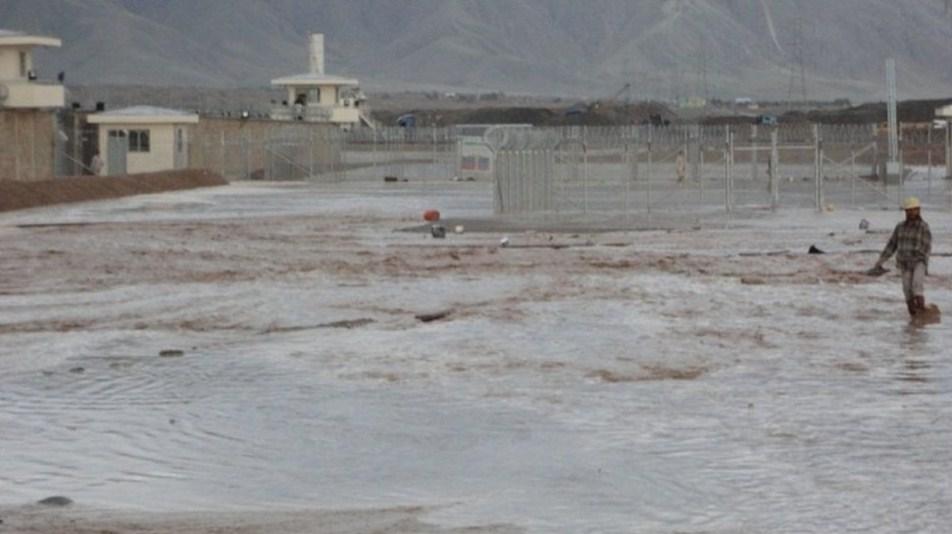This man’s job is to account for the billions of US aid spent in Afghanistan
Flooding envelops Baglan prison in Afghanistan.
President Barack Obama recently said "it's harder to end wars than it is to begin them,” as he outlined his plan to withdraw all the troops in Afghanistan by the end of 2016. However, he had little to say about the financial cost of reconstructing a country ravaged by the longest war in American history.
More than $103 billion has already been spent to help rebuild Afghanistan — more than the US has ever spent on any other single country. While the money is supposed to go to rebuilding necessary infrastructure like prisons and hospitals, not all of it has been accounted for or spent appropriately, and Special Inspector General to Afghanistan John Sopko has noticed.
“We’ve wasted a lot of money,” he said.
Appointed by President Obama in 2012, the special inspector general is tasked with providing oversight of reconstruction projects in Afghanistan. Essentially, Sopko’s job is to track down corruption, waste and fraud and to make sure it doesn’t keep happening. His office has 340 ongoing probes and has secured 42 convictions.
Most recently, the office released a report on Baghlan prison, a State Department-funded project that cost taxpayers $11.3 million and is wracked with problems.
“Unfortunately, like we see in a lot of situations, it was poorly constructed not to U.S. standards,” Sopko said. “It’s so poorly built that you can take the bricks out and escape.”
This points to an ongoing issue in Afghanistan: the difficulty of planning and completing construction in a dangerous country with serious security risks. “If you don’t do oversight in a country like Afghanistan on construction, you’re bound to have some problems,” Sopko said.
While there needs to be better oversight, and Congress has started to take the inspector general recommendations seriously, Sopko said the US government doesn’t even have an accurate list of where its money has gone.
With another $18 billion of money yet to be spent, he said it’s imperative to keep looking forward. “What’s really critical,” he said, “is any gains we have made, any fragile gains, are at risk if we really don’t pay attention to that money going forward.”
“We spent too much money, too fast, in too poor a country with too little oversight, and that’s the lessons learned for the future,” he said.
President Barack Obama recently said "it's harder to end wars than it is to begin them,” as he outlined his plan to withdraw all the troops in Afghanistan by the end of 2016. However, he had little to say about the financial cost of reconstructing a country ravaged by the longest war in American history.
More than $103 billion has already been spent to help rebuild Afghanistan — more than the US has ever spent on any other single country. While the money is supposed to go to rebuilding necessary infrastructure like prisons and hospitals, not all of it has been accounted for or spent appropriately, and Special Inspector General to Afghanistan John Sopko has noticed.
“We’ve wasted a lot of money,” he said.
Appointed by President Obama in 2012, the special inspector general is tasked with providing oversight of reconstruction projects in Afghanistan. Essentially, Sopko’s job is to track down corruption, waste and fraud and to make sure it doesn’t keep happening. His office has 340 ongoing probes and has secured 42 convictions.
Most recently, the office released a report on Baghlan prison, a State Department-funded project that cost taxpayers $11.3 million and is wracked with problems.
“Unfortunately, like we see in a lot of situations, it was poorly constructed not to U.S. standards,” Sopko said. “It’s so poorly built that you can take the bricks out and escape.”
This points to an ongoing issue in Afghanistan: the difficulty of planning and completing construction in a dangerous country with serious security risks. “If you don’t do oversight in a country like Afghanistan on construction, you’re bound to have some problems,” Sopko said.
While there needs to be better oversight, and Congress has started to take the inspector general recommendations seriously, Sopko said the US government doesn’t even have an accurate list of where its money has gone.
With another $18 billion of money yet to be spent, he said it’s imperative to keep looking forward. “What’s really critical,” he said, “is any gains we have made, any fragile gains, are at risk if we really don’t pay attention to that money going forward.”
“We spent too much money, too fast, in too poor a country with too little oversight, and that’s the lessons learned for the future,” he said.
Every day, reporters and producers at The World are hard at work bringing you human-centered news from across the globe. But we can’t do it without you. We need your support to ensure we can continue this work for another year.
Make a gift today, and you’ll help us unlock a matching gift of $67,000!
